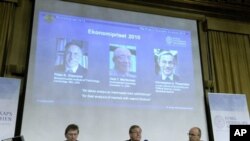Two Americans and a British-Cypriot have been awarded the 2010 Nobel Prize for Economics in honor of their research into search friction, which attempts to explain the difficulties of matching supply and demand, particularly in the labor market.
The Royal Swedish Academy of Sciences today awarded the economics Nobel to Peter Diamond of the Massachusetts Institute of Technology; Dale Mortensen of Northwestern University; and Christopher Pissarides of the London School of Economics. The Academy's citation credits the three with "help[ing] us understand the ways in which unemployment, job vacancies, and wages are affected by regulation and economic policy."
Search friction theory explores such problems as how high unemployment can be accompanied by a large number of job openings. The work of the three newest Nobel laureates looks at such apparent contradictions as when improvements in productivity - economic output per unit of labor - can actually lead to reduced unemployment.
Professor Mats Persson, a member of the academy, explains:
"Search friction is there in the real world. You cannot do much about these frictions; they are just there," Persson said. "But they mean that the market does not function like the traditional perfect competition market. It is much more complicated than that, and much more strange. For example, there could be underutilized resources, or consumer goods that go unsold at the same time there are customers trying to find exactly these products, and in the labor market there is unemployment at the same time there are vacancies."
Reached by telephone at his office at the London School of Economics, Christopher Pissarides said his research had clear implications for policy makers, especially during this period of high unemployment in both Europe and North America.
"What we should really be doing is making sure that the unemployed do not stay unemployed for too long," said Pissarides. "We should try to give them direct work experience - not necessarily expensive training programs, but direct work experience so that they do not lose their attachment to the labor force. Eventually they will move into more regular types of jobs."
One of the winners, 70-year-old Professor Peter Diamond of MIT, once taught Ben Bernanke, current head of the U.S. Federal Reserve Board, and has himself been nominated by President Barack Obama to a seat on the Fed's board of governors. That nomination has been blocked since April by Senate Republicans.
The economics prize was not among the five awards specified in Alfred Nobel's 1895 will. Established and endowed in 1968 by Sweden's Riksbanken central bank, the prize is accompanied by the same cash award of about $1.3-million as the prizes for medicine, chemistry, physics, literature and peace. All Nobel Prize winners are invited to Stockholm and Oslo, Norway for formal award ceremonies in December.
Three Share Economics Nobel for Search Friction Work




